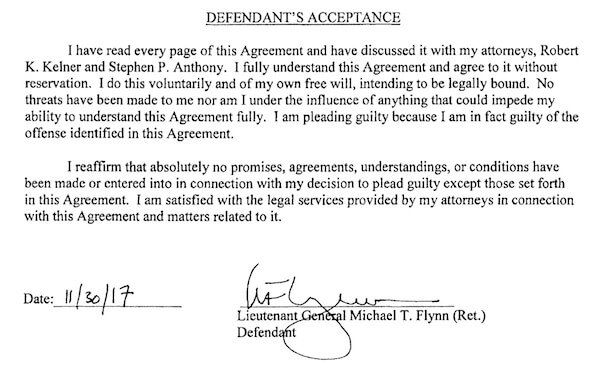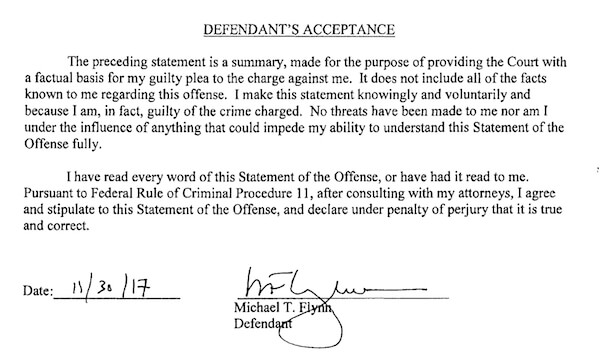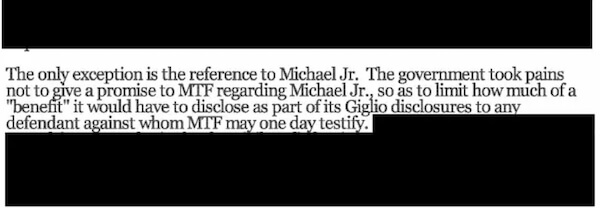In this post I’m going to begin to explain why I am not impressed by the case for the vindication of Michael Flynn. I emphasize at the outset that we don’t really know much about the pieces of evidence, many of which are heavily redacted, and we have not heard the government’s response. However, I think we know enough to say that Flynn is going to have to wait for his inevitable pardon. Based on what I have seen, nothing that happens in court is likely to result in dismissal of his case — unless, of course, the partisan troll who runs the Justice Department presses his thumb harder on the scale than he already has.
I am going to discuss two documents about which we know very little, and offer an educated guess as to what kinds of conversations could have been going on behind the scenes that would result in the generation of such documents. This explanation takes long enough that it will have to span two posts.
In this post, we’ll start with the claim that there was a side deal not to prosecute Flynn’s son. Allow me to summarize the so-called “evidence” of that proposition. First, we have Flynn averring in writing, under oath, that he was guilty. He denies in writing that there was any side deal whatsoever, and affirms that he was pleading guilty because he was guilty. I know, I know: he would say that to protect his son. What else do we have? Basically this: months after his plea, we have Flynn’s lawyers saying “we had a side deal that you would not prosecute Flynn’s son” and the government saying in response “the hell we did.”
That’s the evidence! For real.
Look for yourself. First we have Flynn’s signed plea agreement filed December 1, 2017. Here is his signature affirming that there are no side deals:

And here is the Statement of Offense, and Flynn’s signature affirming under penalty of perjury that it is true.

Now, the Shocking New Evidence. Here are two emails. Note that these emails were sent months later, in March 2018. Here is the recent court filing they are attached to, and here are the screenshots. First, one Covington lawyer to another:

And here is the Assistant U.S. Attorney denying it:

“The only exception is the reference to Michael Jr. The government took pains not to give a promise to MTF [Gen. Flynn] regarding Michael Jr., so as to limit how much of a ‘benefit’ it would have to disclose as part of its Giglio disclosures to any defendant against whom MTF may one day testify.” (Giglio disclosures, in the federal system, are disclosures of promises, benefits, deals given to a witness — basically any incentive to testify — given to lawyers of defendants against whom the witness might testify.)
It has been sad to watch what has happened to Andy McCarthy, who these days routinely adopts absurd Trumpist positions and gives a thin and easily pierced intellectual cover for them. He says: “These passages cited in Powell’s exhibits tend to corroborate the claim of an agreement not to prosecute Flynn’s son. It is fair, then, to infer that the threat of such a prosecution was indeed used to pressure him.” I think that is a stretch, to put it kindly. The documents indicate nothing of the sort, and can easily picture a conversation that went something like the following.
First, let’s set the positions of the parties. We don’t know this to be the case; again, it’s a hypothetical exercise but an educated guess. Flynn doesn’t want his son to be prosecuted. It’s a genuine sentiment, plus, it’s a common thing for people placed in difficult positions (not wanting to plead, not wanting to testify) to make reference to their family in their decisionmaking. (“I’m not scared to testify, but these people are going to kill my family” is something I have heard literally dozens of times in my career.) So Flynn tells his lawyers at Covington and Burling: “make it part of the deal that they won’t prosecute my son.” Meanwhile, let’s assume the Assistant U.S. Attorney (AUSA) has no current intention of prosecuting Flynn’s son for involvement with a company that failed to register as a foreign agent. The issue has been investigated and the AUSA doesn’t think there’s a case there. And although you never know what evidence will develop in the future, and so he doesn’t want to commit to the notion that there will be no prosecution, he currently sees it as unlikely that a prosecution will happen. But, critically, he does not want non-prosecution of Flynn’s son to be part of the deal, because if Flynn ever testifies, that will crush his credibility. All any defense lawyer has to ask him is: “Didn’t the government promise not to prosecute your son for you to testify?” The AUSA wants to avoid giving any defense attorney the chance to ask such a question, so he unequivocally does not want non-prosecution of Flynn’s son to be part of any deal. But he has a Covington lawyer freaking out about it in front of him. Here’s the hypothetical conversation:
FLYNN LAWYER: My client wants an assurance that his son won’t be prosecuted.
AUSA: I can tell you that it doesn’t look like there’s a case against his son, but that’s not part of the deal.
FLYNN LAWYER: He wants it to be part of the deal.
AUSA: I understand why he would, but it’s not part of the deal.
FLYNN LAWYER: All he cares about is his son. Look, are you prosecuting his son or not?
AUSA: That’s an internal decision, and as you know new facts can emerge and situations can change, but if it makes you feel better I will tell you that as things stand right at this moment, it does not look like we will be prosecuting the son.
FLYNN LAWYER: So we have a deal.
AUSA: No, I have already said twice, this is not part of any deal. If I include non-prosecution in the deal, I will have to disclose that if he testifies, and any competent defense attorney will rip him to shreds. So no.
FLYNN LAWYER: OK, I understand why you don’t want to disclose it. We’ll just call it a gentleman’s agreement.
AUSA: There is no agreement on that point. Not formally or informally. It’s not part of the deal.
FLYNN LAWYER: You just told me you’re not prosecuting his son. I’m telling him we have a deal.
AUSA: I told you as things stand right now, it does not look like there will be a prosecution of his son, but that could change and we are not making it part of any deal.
FLYNN LAWYER: I’m telling him we have a gentleman’s agreement.
AUSA: You should tell him the truth, which is that we don’t.
And so on. I can easily see a conversation very much like that taking place, the Covington guy wanting to look to his client like he secured agreement on his client’s highest priority, and telling Flynn something like: “Hey, the government says it’s not part of the official deal, but they’re not prosecuting your son.” And Flynn might reasonably even think it was part of a side deal, although he did aver under oath that there was no side deal.
Resulting in emails of the sort we see attached to the latest court filing.
So I’m not impressed by that evidence. Part Two, coming later (tonight or tomorrow), will address the next piece of evidence: the alleged set-up to get Flynn fired and get him to lie. TL;DR: I do not accept the premise that the government was discussing such a set-up, based on the evidence I have seen. I’ll flesh it out later.






